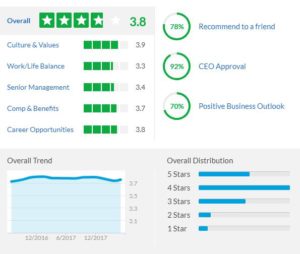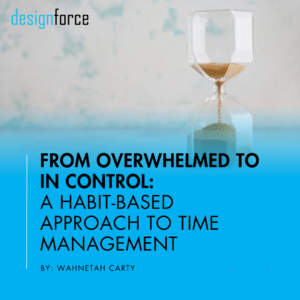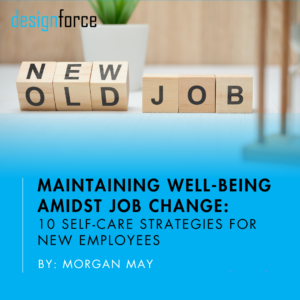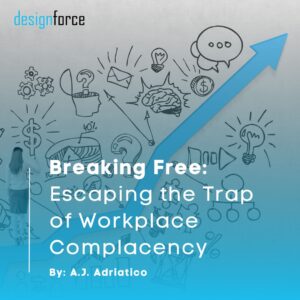 When searching for new job opportunities, where do you begin? Do you ask yourself what the best website is when investing your time in a career search? Let’s dive into Glassdoor and see how it can benefit or harm your employment pursuits. Glassdoor is a website that provides ample information for job-seekers, employees, employers, and non-job seekers about their current companies and potential companies. The high level of workplace transparency presents users an inside look at companies and jobs. Glassdoor’s platform allows users to communicate their opinions anonymously about their organization in hopes of sharing valuable information with job-seekers. Although this information may seem very useful, it can be difficult to determine whether the information is trustworthy enough to influence one’s career decision.
When searching for new job opportunities, where do you begin? Do you ask yourself what the best website is when investing your time in a career search? Let’s dive into Glassdoor and see how it can benefit or harm your employment pursuits. Glassdoor is a website that provides ample information for job-seekers, employees, employers, and non-job seekers about their current companies and potential companies. The high level of workplace transparency presents users an inside look at companies and jobs. Glassdoor’s platform allows users to communicate their opinions anonymously about their organization in hopes of sharing valuable information with job-seekers. Although this information may seem very useful, it can be difficult to determine whether the information is trustworthy enough to influence one’s career decision.
While Indeed is the most popular job search website, Glassdoor follows by a small margin. The company is valued at an estimated $1 billion and seems to be growing annually (with 11 markets outside of the US). It’s concept is different from other job websites, as it offers profiles of companies and employee feedback, open to the public. Glassdoor acquires capital from companies willing to pay to have more access to, as well as the ability to update, their own profiles.
So how much do job-seekers trust Glassdoor’s reviews when analyzing a new company? How much impact does the website really have? You may find yourself analyzing ratings too seriously when considering a new employer. Software Advice, a research provider for small to medium-sized businesses, recently investigated job search market statistics with a focus on Glassdoor. They found that about half of the 5000 participants in their study had used Glassdoor during their job search. Almost 50% of these job seekers had used Glassdoor before they even considered applying to any specific job, while 20% of these job seekers viewed the companies’ Glassdoor profile after viewing a job posting.
To give you more research, the following photo is an example of Glassdoor’s specific ratings of a company provided to job-seekers. As shown, five categories are rated out of five stars as well as three additional company evaluations. The five categories contribute to an overall score out of five stars. In the same survey, Software Advice had also asked the job-seeking participants how significant the five categories had mattered to them when making a judgement to join the company. They found that the compensation and benefits category was most important, followed by work/life balance, career opportunities, culture and values, and senior management in that order. When asked what would impact their decision to not apply to a company, compensation and benefits was still the most important factor followed by work/life balance. Overall, a third of the respondents required a company to have at least an overall score of three stars in order to feel comfortable applying. According to Dawn Lyon, the former Strategic Advisor for Glassdoor, Glassdoor’s data states that culture & values is the number one factor driving employee satisfaction, followed by leadership and then career advancement opportunities.
Regarding the CEO Approval ratings, Software Advice found that a the respondents had split opinions. For half of the job seekers, a negative CEO rating would have very little impact on their decision to apply. On the other hand, the other half of job seekers said that this rating would have a significant impact on their application. Consider how much this rating would affect your decision! Recent reviews are also very important to job seekers, as they seem to take into consideration reviews written within the past 6 months. It is hard to judge a review’s authenticity if it was 2-5 years old, as the company could have drastically changed since then.
The survey also considered the age, urbanicity, and income level of participants. To the researchers surprise, most job seekers were between the ages of 55 and 64. On top of that, individuals with a salary between $25,000 and $50,000 as well as users from a suburban setting were the most active Glassdoor users.
In a recent New Yorker Article, Beth Steinberg, the chief people officer at Zenefits, shared her experience with Glassdoor. Steinberg says, “It’s pretty rare that a job candidate doesn’t look at Glassdoor before they come in. Often, they bring it up in the interview. They’ll say, ‘I read this on Glassdoor. How do you respond?’” Her concerns are a common feeling for most interviewers and employers, but hopefully statistical research about Glassdoor’s impact will help businesses understand and manage their profiles. Asking current employees to consider writing reviews about their workplace will keep the profile continuously updated (within the last 6 months), whether accurate or not. It is important to establish standards of fair compensation and benefits, such that your Glassdoor Comp & Benefits rating is attractive to job-seekers.
It behooves the wise information-seeker to take every Glassdoor review with a grain of salt, as some of the reviews contain biases or underlying personal opinions driven by drama or politics within the workplace. When reviewing these reviews, here are some things to keep in mind: be cognisant of the amount of pros and cons in reviews, evaluate your own admirable values within a company, ask the interviewer almost as many open-ended questions as they ask you, and take a look at company employees’ LinkedIn profiles to get more of the full picture.
When identifying ratings in Glassdoor, it is important to remember that ultimately you’re the one making this decision and that you should not base your opinion off of other people’s experiences. So is Glassdoor your friend or your foe? We think it can be both, depending on how you use it. Make sure you perform copious online research and acquire many data points through a number of parties and industry specific websites such as AIA, ASHRAE, or our own DesignForce website. On top of that, try leveraging your network and asking your friends within the industry for their own trusted recommendations and opinions. And if you’re really not sure where to begin, a career consultant may be a great option (;

Related Posts
Let's learn together.
Stay inspired and in the know on all things A|E|C.
Sign up for our monthly newsletter.










